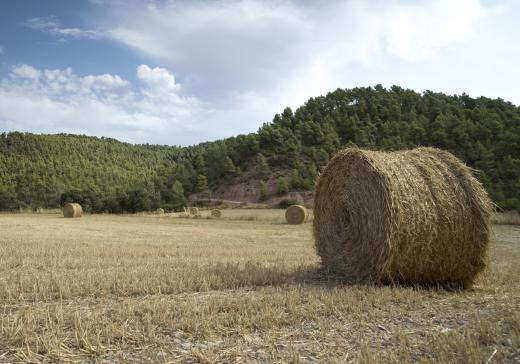A baler knotter is a mechanism that wraps twine around a bale of hay and ties it so that it will stay together. It is a part of a mechanical baler. The baler knotter consists of needle for pulling the twine, a long arm that pushes it around the hay, and a mechanism that ties the knot. A baler knotter can produce single or double knots.
The first action of a baler knotter is for the needle to move the twine to a holder. This holds it in place so that a knife arm can cut the proper length. Then the twine is moved around the bale and towards a piece called the bill hook which pulls it into a knot. Often several spools of twine will be stored inside the baler so that the knotter will have sufficient supply to continuously tie bales over long periods of time.

A baler knotter is meant to create rectangular bales. It is used for both large industrial bales and small bales for independent farms. One of the most significant benefits of the knotter is that it produces bales in a shape that is easier to transport.
While a baler knotter is a sturdy piece of equipment, it needs careful maintenance in order to function properly. One of the biggest challenges with a knotter is that pieces of hay get stuck in the mechanism, preventing smooth functioning. This can cause everything from poorly-tied knots to misshapen bales. A common method of dealing with this issue is to have multiple fans pointed at the knotter while it is working so that it will remain clean and function efficiently throughout hours of work.
Twine tension is another issue to consider with a baler knotter. If it is not taut enough, the bale will be loosely tied. When there is too much tension, it slows the mechanism and causes excessive strain on the machinery. This can result in slower production time and faster wear on the knotter.
While it is still in use, the baler knotter has become less popular, particularly in large industries. For the most part, it has been replaced by round bales. These are much larger than even the most substantial rectangular bales, and they are used primarily on large industrial farms. Another method in which hay is baled into wet balls and wrapped with plastic has also displaced the bailer knotter.
